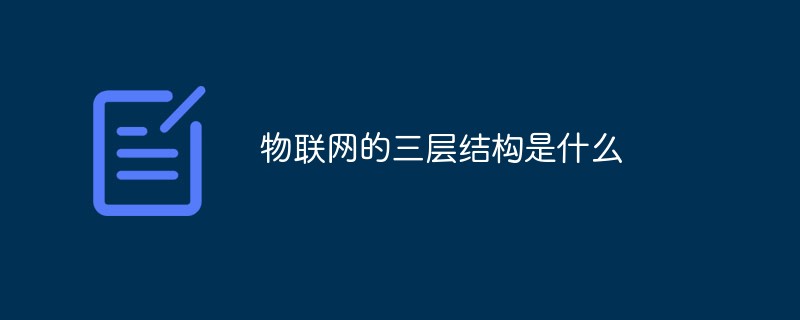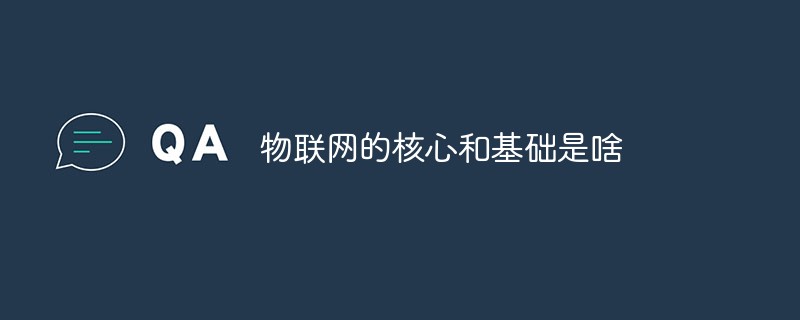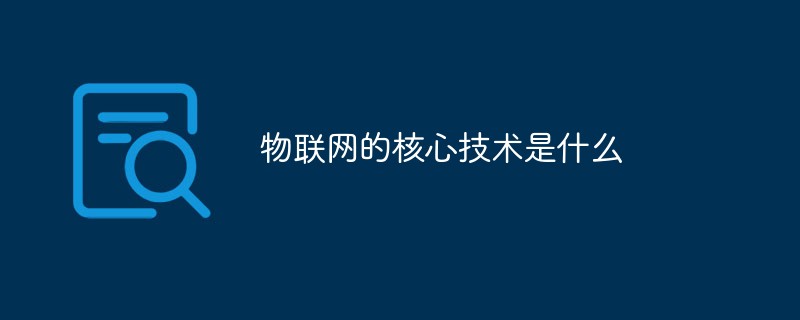 Backend Development
Backend Development Golang
Golang Exploration of the application of Golang language in blockchain IoT scenarios
Exploration of the application of Golang language in blockchain IoT scenariosGo language is widely used in blockchain IoT scenarios. Its main advantages include: writing smart contracts and managing rules and operations for the flow of goods on the blockchain. Develop applications to manage asset transactions and track asset location and status. Efficient, concurrent and open source, suitable for processing large amounts of data and easy to expand and customize.

Exploration of the application of Go language in blockchain IoT scenarios
Introduction
With the rapid development of blockchain and IoT technologies, combining these two technologies to create new possibilities in the field of IoT has aroused widespread interest. Go language is becoming increasingly popular in blockchain IoT scenarios due to its efficiency, concurrency and open source features.
Case Study: Supply Chain Management
In supply chain management, blockchain provides an immutable and transparent way to record and track the flow of goods. Go language can be used to write smart contracts and define the rules and operations of commodities. IoT devices can sense and collect commodity status data, and then transmit the data to blockchain storage.
// 定义智能合约
contract SupplyChain {
// 商品结构体
type Product struct {
Name string
Origin string
Timestamp uint64
}
// 记录商品信息
mapping(string) Product
// 添加商品
func addProduct(name string, origin string) {
timestamp := uint64(time.Now().Unix())
product := Product{name, origin, timestamp}
products[name] = product
}
}Case Analysis: Asset Management
In asset management, blockchain can be used to create secure digital asset ownership records. The Go language can be used to write applications that manage asset transactions. IoT devices can be used to track the location and status of assets.
// 定义资产管理应用程序
package main
import (
"fmt"
"github.com/hyperledger/fabric-sdk-go/pkg/client/channel"
)
func main() {
// 连接到区块链网络
client, err := channel.New(channel.WithUser("user"), channel.WithOrderer("orderer"))
if err != nil {
fmt.Println("Error connecting to the channel:", err)
return
}
// 创建资产
tx, err := client.Execute(channel.Request{
ChaincodeID: "asset",
Fcn: "createAsset",
Args: []string{"asset1", "John Doe"},
})
if err != nil {
fmt.Println("Error creating asset:", err)
return
}
fmt.Println("Asset created:", tx.TransactionID)
}Conclusion
Go language provides many advantages in blockchain IoT scenarios. Its efficiency and concurrency make it suitable for processing large amounts of data. Additionally, its open source nature makes it easy to extend and customize. Through the above practical cases, we have demonstrated the powerful application capabilities of Go language in blockchain IoT scenarios.
The above is the detailed content of Exploration of the application of Golang language in blockchain IoT scenarios. For more information, please follow other related articles on the PHP Chinese website!
 物联网技术架构的最高层是什么Aug 23, 2022 am 10:48 AM
物联网技术架构的最高层是什么Aug 23, 2022 am 10:48 AM物联网技术架构的最高层是应用层;应用层处于物联网三层架构最顶层,应用层基于物联网技术提供丰富的物联网应用,对不同的行业有着不同的应用结果,实现不同行业物联网的智能运用是物联网技术的根本目标。
 物联网的三层结构是什么Jul 01, 2022 pm 02:58 PM
物联网的三层结构是什么Jul 01, 2022 pm 02:58 PM物联网的三层结构是:1、感知层,主要完成信息的采集、转换和收集;该层结构解决的是人类世界和物理世界的数据获取问题,由各种传感器以及传感器网关构成。2、网络层,又称传输层,主要完成接入和传输功能,是进行信息交换、传递的数据通路,包括接入网与传输网两种。3、应用层,解决的是信息处理和人机界面的问题;网络层传输来的数据在这一层里进入各类信息系统进行处理,并通过各种设备与人进行交互。
 go语言可以写物联网吗Dec 28, 2022 pm 04:46 PM
go语言可以写物联网吗Dec 28, 2022 pm 04:46 PM可以写。在物联网领域,用Golang可以高效的接入并管理数以百万的设备;并使用Golang的各种前沿技术实时分析数据并创建数据报告。用Golang开发物联网平台的原因:1、Go的三个作者能力强;2、Go的性能仅次于C/C++;3、入门非常快,大多程序员1-2周都可以上手;4、并发特性好;5、能兼容大量的硬件设备;6、有良好的社区支持;7、可用干净的代码帮助开发人员加快速度。
 边缘人工智能(Edge AI)能为我们做些什么?Apr 09, 2023 pm 02:11 PM
边缘人工智能(Edge AI)能为我们做些什么?Apr 09, 2023 pm 02:11 PM人工智能 (AI) 是一种分散式计算,它允许设备在与用户交互的最近点做出以数据为主导的决策。这种技术的好处包括改善隐私和节省成本,但数据通常在处理后被丢弃。即将到来的进步,包括 5G 技术和成本更低的处理芯片,将使边缘人工智能对某些应用越来越有用——从智能家居设备到医疗技术。想象一下,您希望您的新智能恒温器能够快速调高温度,以便在异常寒冷的一天下班回家后,您的房子会变得温暖。您从智能手机连接并要求它采取行动。您不会知道,但该操作可能需要几秒钟,因为它将您的请求发送到云并接收返回的指令。现在再想象
 利用人工智能解决石油和天然气排放挑战Apr 08, 2023 pm 05:51 PM
利用人工智能解决石油和天然气排放挑战Apr 08, 2023 pm 05:51 PM随着应对气候危机的持续努力,以及海湾合作委员国家会致力于实现未来净零碳排放的强大势头,油气公司的当务之急变得前所未有的重要。从区域上看,油气行业通过直接上游、中游和下游(范围1)、间接能源(范围2)和其他间接排放(范围3),占整个油气行业温室气体排放量的9%。仅仅向低碳替代能源过渡还不足以确保所需的减排,而永久解决这一问题需要与一种不同于其他技术的有影响力的技术——人工智能(AI)相结合。尽管净零路线伴随着即时的时间限制,但油气公司可以在乐观的情况下采用以技术为主导的方法。毕竟,在最近的突破性行
 物联网和人工智能将如何改变医患关系?Apr 14, 2023 am 11:01 AM
物联网和人工智能将如何改变医患关系?Apr 14, 2023 am 11:01 AM医疗保健从来都不是一个容易讨论的话题。无论是在医生的办公室还是在舒适的家里,谈论健康都会让人不知所措。大多数人都不喜欢去看医生。对医生发现问题的焦虑或不好意思问问题是人们更愿意在预约时的部分原因。再加上初级保健医生与患者相处的时间略多于15分钟,因此没有足够的时间来讨论问题或深入研究任何测试结果。我们通常只在每年一次的医生就诊时讨论自己的健康状况。所以签到很重要,但它们只提供了正在发生的事情的一个快照。我们没有每天监控自己健康状况的习惯,也没有远程监控的习惯。持续跟踪患者的生命体征有助于患者及医
 物联网的核心和基础是啥Jul 20, 2022 pm 03:54 PM
物联网的核心和基础是啥Jul 20, 2022 pm 03:54 PM物联网的核心和基础是“互联网”。物联网即“万物相连的互联网”,是在互联网基础上延伸和扩展的网络,将各种信息传感设备与网络结合起来而形成的一个巨大网络,实现任何时间、任何地点,人、机、物的互联互通。物联网是一个基于互联网、传统电信网等的信息承载体,它让所有能够被独立寻址的普通物理对象形成互联互通的网络。
 物联网的核心技术是什么Jul 28, 2022 am 11:29 AM
物联网的核心技术是什么Jul 28, 2022 am 11:29 AM物联网的核心技术是:1、射频识别技术,通过无线电信号识别特定目标并读写相关数据的无线通讯技术;2、网络通信技术,机器与机器之间能够在无人为干预的情况下进行及时的通信和操作;3、GPS技术,可以和无线通讯技术相结合,在物流智能化、智能交通中占据重要作用;4、计算机技术,检测数据后上传至环境监控云平台就是运用了计算机技术;5、传感器技术,可以应用在测试领域、智慧农业领域等等。


Hot AI Tools

Undresser.AI Undress
AI-powered app for creating realistic nude photos

AI Clothes Remover
Online AI tool for removing clothes from photos.

Undress AI Tool
Undress images for free

Clothoff.io
AI clothes remover

AI Hentai Generator
Generate AI Hentai for free.

Hot Article

Hot Tools

SublimeText3 English version
Recommended: Win version, supports code prompts!

SAP NetWeaver Server Adapter for Eclipse
Integrate Eclipse with SAP NetWeaver application server.

WebStorm Mac version
Useful JavaScript development tools

SublimeText3 Linux new version
SublimeText3 Linux latest version

MinGW - Minimalist GNU for Windows
This project is in the process of being migrated to osdn.net/projects/mingw, you can continue to follow us there. MinGW: A native Windows port of the GNU Compiler Collection (GCC), freely distributable import libraries and header files for building native Windows applications; includes extensions to the MSVC runtime to support C99 functionality. All MinGW software can run on 64-bit Windows platforms.





